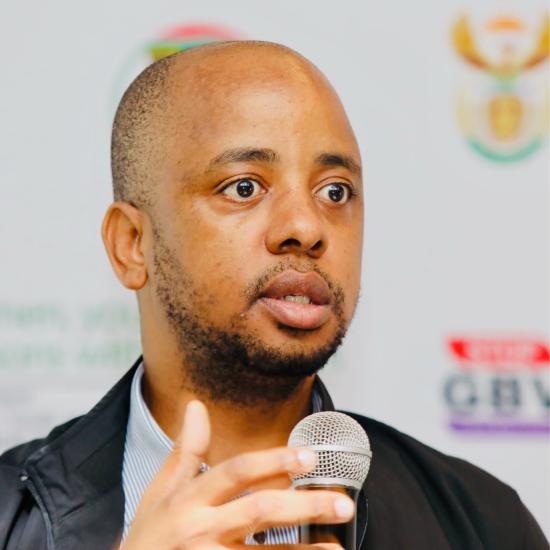Empowering women
through equitable socio-economic development

South Africa’s G20 Presidency comes at a critical moment, as the world grapples with overlapping crises – from climate change and economic underdevelopment to inequality, poverty and geopolitical instability.
Addressing these challenges requires bold, transformative policies that promote inclusive and sustainable development. South Africa's commitment towards this agenda is guided by the principles of Solidarity, Equality and Sustainability.
Globally, we are facing a care crisis of unprecedented scale, making it increasingly difficult for individuals, families and communities to balance paid work and unpaid care, often resulting in poor physical, mental and social outcomes. Since the adoption of the Beijing Declaration and Platform for Action, over the years, progress towards equal rights for women has remained elusive. No country has achieved gender equality and the COVID-19 pandemic has eroded the limited gains that have been made.
The Decade of Action to deliver the Sustainable Development Goals and efforts to recover better from the pandemic, offer a chance to transform the lives of women and girls, today and tomorrow.
South Africa is the only African nation with permanent membership in the G20. This current presidency marks a historic milestone – the first time the G20 summit will be hosted on African soil. This moment offers both a symbolic milestone and a strategic opportunity.
Empowerment of Women Working Group
Centered around the Empowerment of Women Working Group (EWWG) are three key priorities: policy perspectives on the care economy – paid and unpaid care work and household responsibilities; promoting financial inclusion of and for women; and addressing gender-based violence and femicide.
The EWWG is a dedicated forum within the G20 framework aimed at promoting gender equality and empowering women worldwide. Established to address the unique challenges faced by women in the economy, the group focuses on fostering inclusive growth, enhancing women’s participation in the labour market and supporting women entrepreneurs.
As South Africa’s prosperity is inextricably linked to the strength of its economic and trade relationships across the continent, this G20 Presidency serves as a strategic opportunity to uplift the entire African continent. However, Africa’s full potential cannot be realised while women remain on the margins of economic participation.
Decisive shift
Forty years have passed since the 3rd United Nations Women’s Conference in Nairobi in 1985, and with just five years remaining to reach the Sustainable Development Goals (SDGs) critical gaps in implementation still exist.
This is despite strong global commitments like the Beijing Declaration and Platform for Action. We need a global decisive shift; from research to results, from ideation to implementation, from isolated efforts to shared accountability, from competition to collaboration.
Experts believe that advancing women's empowerment can significantly boost global gross domestic product, reduce poverty, and accelerate progress towards the SDGs.
As the world continues to evolve, the G20's commitment to empowering women signals a pivotal step towards inclusive growth and shared prosperity.
Overcoming barriers
Despite advancements, challenges such as cultural barriers, unequal access to education, and the limited representation of women in leadership roles continue to exist. The G20 persists in emphasising the significance of implementing comprehensive and multifaceted strategies to overcome these barriers.
Looking ahead, the G20 EWWG endeavours to strengthen its initiatives through enhanced collaboration among member nations, the utilisation of digital technologies, and the cultivation of a global environment conducive to women’s empowerment. The group acknowledges that empowering women is not only a moral duty but also a strategic catalyst for sustainable economic growth and development.
The G20 group plays a crucial role in promoting gender equality worldwide. Through the implementation of targeted policies and the encouragement of international cooperation, it aims to establish a future in which women can fully participate in and benefit from economic opportunities, thereby fostering more inclusive and sustainable development on a global scale.
Primary objectives
The group’s objectives include:
Advancing women’s economic participation: Promoting policies that increase women’s participation in the workforce, including reducing barriers to entry and ensuring equal opportunities.
Supporting women entrepreneurs: developing initiatives to facilitate access to finance, markets and technology for women-led businesses.
Promoting gender-inclusive policies: Encouraging member countries to implement gender-responsive policies that address issues such as unpaid work, gender-based violence and career development.
Addressing data gaps: Improving gender data collection and analysis to inform better policymaking and track progress effectively.
In recent years, the G20 EWWG has launched several programmes, including:
Women’s infrastructure and employment initiative, which aims to create more inclusive infrastructure projects that support women’s employment.
Best practices and policy recommendations to foster gender equality in different sectors.
Innovative Financing Mechanisms to increase investment in women-centric projects and startups.
Chaired by the Minister in The Presidency for Women, Youth, and Persons with Disabilities, Sindisiwe Chikunga, the G20 EWWG is an intergovernmental platform that will drive global efforts to create a more equitable and prosperous South Africa and Africa. It aims to highlight the importance of collective action in promoting women’s leadership and economic empowerment, fostering solidarity, equality and sustainability.




